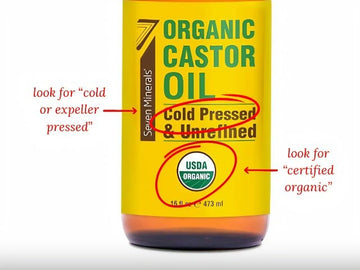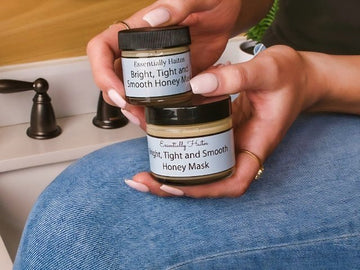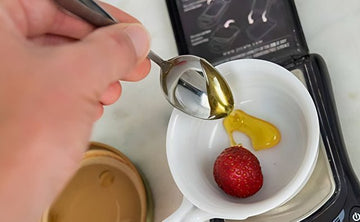How many of you know someone, or have yourself struggled with skin issues like eczema, persistent dryness, incessant itching, rashes, general skin irritation, or types of dermatitis over the past year?
The increase in individuals with sensitive skin is undeniable, and we might just know the reason. One particular ingredient, which many of you likely use regularly, has been wreaking havoc on skin for nearly eight decades.
THE JOURNEY OF SKINCARE LEADING TO THE SENSITIVE SKIN OUTBREAK
The beauty secrets of ancient civilizations like the Egyptians and Greeks were anchored in nature. They used honey, milk, olive oil, yogurt, and clay to enhance their skin. With only nature as their source of ingredients, they utilized honey's antibacterial traits, clay's mineral enrichment, olives' fortifying properties, and the exfoliating capabilities of dairy.
Jumping ahead to Medieval times, beauty aficionados became a tad more inventive. They incorporated the calming effects of aloe and cucumber and utilized the toning qualities of vinegar. It sounds like a modern-day green skincare routine, doesn't it?

Renaissance women, in their pursuit of beauty, took things a bit too far, opting for white lead masks, borax, and sulfur to achieve a paler complexion, signifying a life free from sun-induced labor. Thankfully, the health risks these ingredients posed led to the decline of this trend – and much healthier-looking women!
Fast forward to the late 19th century when the advent of large-scale chemical manufacturing introduced products like Vaseline, Chapstick, and baby powder. This was soon followed by the introduction of sunscreens, Carmex, and notably, the ingredient believed to be at the center of the sensitive skin issue - sodium lauryl sulfate.
DECODING SODIUM LAURYL SULFATE
Sodium lauryl sulfate (SLS) initially found its use as an engine cleaner during WWII. The beauty sector seemingly thought, if it can clean engines, it must be able to remove greasy makeup! What? Odd leap, but just go with it for now.
In the subsequent decades, SLS became a staple in almost every foamy product, including toothpaste, shampoos, cleansers, detergents, and even shaving creams. Initially derived from petroleum, now you can find versions based on coconut and palm in various brands, including those labeled as natural.
It's worth noting that sodium cocosulfate, another similar compound, isn’t much gentler when it comes to skin irritation. And while sodium laureth sulfate, a derivative of SLS, is touted as milder, its potential contamination with 1,4-dioxane makes it a questionable choice.
IS SODIUM LAURYL SULFATE ACTUALLY SKIN-FRIENDLY?
At some point, people finally started to question whether this engine degreaser was truly safe for human skin, which happens to behave quite differently than, um, engines.
A study published in 1983 in the International Journal of Toxicology suggested that both Sodium and Ammonium Lauryl Sulfate seemed safe if used briefly and then rinsed thoroughly from the skin. But let's think on that: You could probably write the same sentence about peanut butter, ranch dressing, or hot sauce, but does that mean any of those things are GOOD for your skin??
Interestingly, even though SLS is deemed safe, SLS has been used regularly in medical studies for many years to create the skin irritation required for testing soothing agents. (Again, scratching my head.)
Moreover, numerous studies have demonstrated significant skin irritation and compromised moisture retention even at SLS concentrations well below the recommended 1% for topical products. This raises concerns, considering the even higher concentrations in common household products.
OUR TAKE ON SLS AND SKIN SENSITIVITY
Our theory (unproven thus far) is that decades of cumulative exposure to SLS and its cousin SLES (sodium laureth sulfate) have left many of us in a state of long-term, low-level irritation, with lower thresholds for conditions like eczema and dermatitis.
In fact, it turns out that about half of people with eczema and dermatitis have an allergy to SLS, leading to a vicious cycle of chronic irritation and inflammation when continuing to use products containing SLS.
Over time, the consistent exposure to SLS impacts the skin's natural protective barrier and its inherent healing capabilities. So, what's the remedy for sensitive skin woes? The answer is simple:
Eliminate SLS!
THE ROAD TO AN SLS-FREE ROUTINE
Begin by reading the ingredient list of every foamy product you use. To get you started, here are a few SLS-free favorites from a friend with sensitive skin (just personal recommendations, not official endorsements):
- Jason Sea Fresh toothpaste
- Molly’s Suds Laundry Detergent
- Common Good dishwashing liquid
- Supernatural cleaning products
- Haircare by Josh Rosebrook, Innersense, or Just Nutritive
Alongside avoiding SLS, we also advise steering clear of synthetic fragrances, another common skin irritant. For those with severe skin irritation, using unscented products for a few weeks can help. Once things settle, you can then reintroduce products containing skin-compatible essential oils for fragrance.
WHAT ESSENTIALLY HAITOS PRODUCTS CAN I USE FOR SLS-FREE SKINCARE?
Honestly – every single one of them!
Clean B Cleansing Nectar is an oil cleanser, is non-foaming, and gently washes away the dirt, grime, and oils of the day.
Clean B Gentle Honey Cleanser is made of, well, honey! And vegetable glycerin and two natural cleansers derived from coconut oil. And that’s it.
Coffee Lover’s Exfoliating Face Wash is made from a blend of gentle, natural cleansing agents, organic oils, clay and coffee! Nothing to irritate your sensitive skin (as long as you don’t over-exfoliate).
And More Than a…Sugar Scrub is our newest cleanser. It’s made with the same gentle cleansing agents as our Coffee Lover’s Face Wash, natural oils, clay – and of course, sugar! We do include skin friendly essential oils to mildly scent this body scrub.
Conclusion:
Here’s the great news for sensitive skin: changing your routine doesn’t mean you have to give up the good things in life - you just need to be a bit more particular (which in the long run, is a great thing). Our cleansing products are luxurious, effective, and pleasurable to use in your daily routines.
In fact, you might find that once you go Natural, you never go back to anything else.







